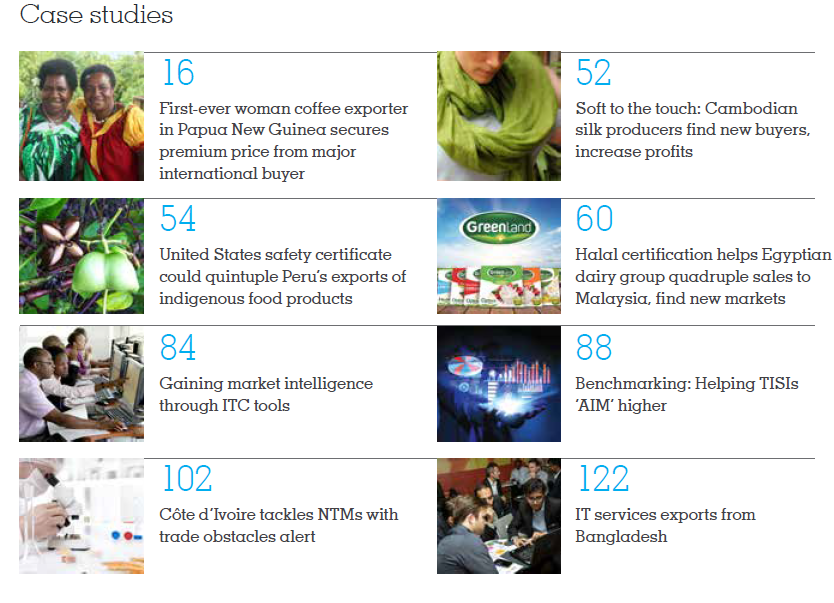- 经济管理
- 行业报告
- 企业管理与咨询报告
中小企业竞争力展望2015(英文 268 页)
Contents
Acronyms XI
Foreword XII
Executive Summary XIV
Acknowledgements XXX
Part I. SMEs and global markets: The missi ng link for
inclusive growth
CHAPTER 1: Understanding SMEs
SMEs contribute significantly to employment, GDP and exports
Many shapes and sizes
Firm size and the structural make-up of economies
CHAPTER 2: Why the ‘middle’ matters
Strong SMEs are exporters
Medium-sized firms for healthy economies
It’s hard to grow up
Tax and access to finance policies penalize medium-sized firms
CHAPTER 3: SMEs, the missing link for inclusive growth
SMEs account for nearly 70% of employment
International SMEs: More employment, earnings, profits
Gains for women
Gains for youth
CHAPTER 4: Being part of international value chains
Stepping stones to internationalization
Moving up
CHAPTER 5: Internationalizing the elegant way
What makes an SME competitive?
Leadership and management
Accessing and interpreting information
Signalling quality and sustainability with standards
Financing working capital and investments
Access to skills for competitive edge
Access to inputs and customers
Keys to innovation
CHAPTER 6: Addressing the challenges of internationalization
SMEs identify constraints
Business information: Cheap for multinationals, prohibitively expensive for SMEs?
Complying with standards and regulations
Access to affordable credit and financing
Access to skilled labour
Logistics, a higher burden for SMEs
Technology and scope for innovation
Management skills and entrepreneurial barriers
CHAPTER 7: Small but numerous: Pooling resources, creating linkages
TISIs pool information and strengthen the voice of SMEs
Making the most of clusters
CHAPTER 8: SMEs and global policy initiatives
The United Nations Global Goals
SMEs and the G20/B20
WTO Trade Facilitation Agreement
Different policy forums, coherent approaches
ENDNOTES
Part II. SME competitiveness : A pilot assessment
CHAPTER 9: The SME Competitiveness Grid
A working definition of competitiveness
The SME Competitiveness Grid: An overview
Three layers of SME competitiveness
Three pillars of SME competitiveness
CHAPTER 10: SME competitiveness: Using the grid
Using the SME Competitiveness Grid
Firm level indicators
Immediate business environment indicators
National environment indicators
CHAPTER 11: SME competitiveness trends
Regional trends
ENDNOTES
Summary of findings
Part III. Country Profiles
How to read country profiles
Inde x of countr y profiles
Endnotes

内容
第十一缩略语
第十二前言
内容提要十四
致谢XXX
第一部分中小企业和全球市场:米西NG链接
包容性增长
第1章:了解中小企业
中小企业显著就业,国内生产总值和出口的贡献
许多形状和大小
企业规模和经济的结构化妆
第2章:为什么'中间'的事项
强大的中小企业是出口
中型公司的经济健康发展
这是很难成长起来
税和获得融资的政策惩罚中型企业
第3章:中小企业来说,缺少的环节包容性增长
中小企业占近70%就业
国际中小企业:更多的就业,收入,利润
收益为女性
收益青年
第4章:国际价值链的一部分,作为
垫脚石国际化
向上
第5章:国际化的优雅的方式
是什么让中小企业的竞争力?
领导和管理
访问和解释信息
信令质量和可持续性与标准
融资营运资本及投资
获得技能的竞争优势
访问输入和客户
关键创新
第6章:应对国际化的挑战
中小企业找出制约
工商资料显示:便宜的跨国公司,中小企业昂贵?
与标准和法规
获得负担得起的信贷和融资
获得熟练劳动力
物流,为中小企业的负担加重
技术和范围的创新
管理技能和创业的障碍
第七章:小,但很多:集中资源,建立联系
TISIs池信息,加强中小企业的声音
充分利用集群
第8章:中小企业和全球政策举措
联合国全球目标
中小企业和G20 / B20
WTO贸易便利化协定
不同的政策论坛,连贯性的方法
尾注
第二部分。中小企业补偿装置titive内斯:一个试点评估
第九章:中小企业竞争力格
竞争力的工作定义
中小企业竞争力格:概述
中小企业竞争力的三层
中小企业竞争力的三大支柱
第10章:中小企业的竞争力:使用网格
利用中小企业竞争力的网格
企业层面的指标
直接的商业环境指标
国家环境指标
第11章:中小企业竞争力的发展趋势
区域趋势
尾注
结果摘要
第三部分。国家概况
如何解读国家概况
尾注
×所属专题:下载《中小企业竞争力展望2015(英文 268 页)》需 50点,包月包季包年会员(点此注册)免费下载。
一、非注册用户快速自助下载两步完成:1 注册(点此),2 购点卡(点此) 充值(点此)自主下载
二、非注册用户直接付款(点此付款),付款后短信(18121118831或加微信)告知题目或者Email,我们通过邮件发给您。需要帮助?专题跟踪研究报告
企业出海 新质生产力 低空经济 生成式AI 工业互联网 数字藏品 动力电池 ESG 数字化转型 机械零部件 氢能 碳中和 区块链 元宇宙 建筑 矿产 安永 数字货币 新基建 日化 案例分析 毕马威 贝恩咨询 普华永道 波士顿 罗兰贝格 德勤咨询 埃森哲 麦肯锡 电商 金融科技 人工智能 物联网 互联网金融 大数据 3D打印 食品饮料 家电行业 零售连锁 新能源 商业地产 快递行业 机械设备 汽车 核电 电子产业 电力行业 新兴产业 纺织服装 医药生物 广告传媒 金融投资 航空 旅游 酒业 能源 有色金属 通信 石油化工 物流供应链 房地产 可行性报告 PPP 商业计划书 五力分析 并购重组 发展战略 SWOT 产业链 钻石模型 价值链 PEST 人力资源 面板模型 stata 精华推荐 供应链金融 互联网+ 机器人 O2O 教育培训 论文资料查找 写作修改服务 EMBA论文写作 硕士论文 本科论文 论文写作每年为数千个企事业和个人提供专业化服务;量身定制你需要的研究报告的资料和报告
相信我们!企业客户遍及全球,提供政府部门、生产制造企业、物流企业、快消品行业专业化咨询服务;个人客户可以提供各类经济管理资料、商业计划、PPT、MBA/EMBA论文指导等。
点此填写您的需求15+年的经验,值得信赖
可以QQ联系我们:896161733;也可以电话:18121118831

